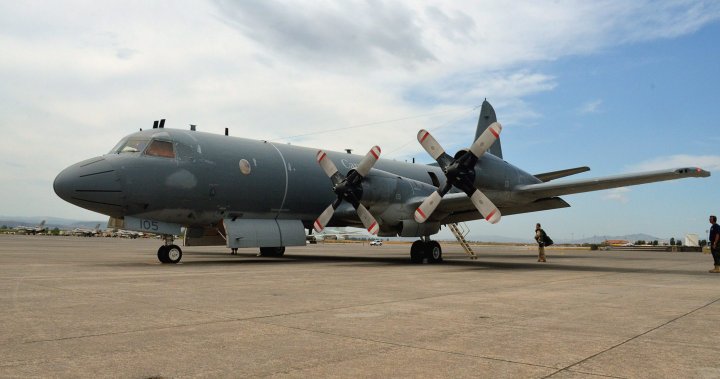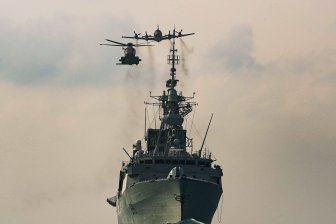Canadian military plane ‘intercepted’ by Chinese jets during latest mission – National | Globalnews.ca
Chinese military jets “intercepted” a Royal Canadian Air Force (RCAF) surveillance plane during the latest rendition of a United Nations’ mission in the Indo-Pacific, the Department of National Defence says.
The incident occurred during the “most recent iteration” of Operation Neon, a UN sanctions mission on North Korea, the department told Global News on Wednesday. An official within the department told Global News that there were multiple interceptions, and that they happened “regularly” over the course of the operation.
Read more:
Why is China ‘buzzing’ Canadian, Australian planes? Here’s what you need to know
Read More
-
![]()
Why is China ‘buzzing’ Canadian, Australian planes? Here’s what you need to know
Canadian Armed Forces (CAF) had been deployed in the Indo-Pacific region for the mission’s latest iteration in September with HMCS Vancouver and a CP-140 Aurora aircraft, the government indicates on its website. That mission wrapped up in November, and the Aurora returned on Nov. 20.
“What we can confirm is that, during this most recent iteration of Operation Neon, the Canadian Armed Forces were intercepted by the People’s Liberation Army Air Force,” a spokesperson said in an email.
“Canada has been clear in its expectation that all intercepts should be conducted in a safe and professional manner and refrain from impeding lawful operations in international airspace. The CAF’s primary concern is the safety of its aircrew.”

Over the summer, multiple sources in the CAF and the federal government told Global News that Chinese jets were repeatedly “buzzing” a Canadian surveillance plane used in the UN mission.
Sources told Global News in June that there had been approximately 60 of these types of intercepts with Chinese fighter jets since Christmas 2021, over two dozen of which have been deemed dangerous.
Those jets had been frequently flying as close as 20 to 100 feet from the Canadian plane, sources said at the time — so close that Canadian pilots can make eye contact with the Chinese pilots, and sometimes see them raising their middle fingers. The sources spoke on condition of anonymity to discuss sensitive information.
At the time, a spokesperson for the Department of National Defence had said the incidents are “of concern and of increasing frequency.”
“In some instances, the (Canadian) air crew felt sufficiently at risk that they had to quickly modify their own flight path in order to increase separation and avoid a potential collision with the intercepting aircraft,” the spokesperson said in June.

Canada, alongside allies such as Australia, the United Kingdom and the United States, has been contributing to the mission since 2018, the government said on its website. The mission’s objective is to conduct surveillance operations to identify suspected maritime sanctions evasion activities by North Korea.
The UN sanctions, imposed between 2006 and 2017, aim to pressure North Korea to abandon its weapons of mass destruction programs and respond to North Korean nuclear weapon tests and ballistic missile launches.
“Canada remains committed to its sanctions monitoring activities under Operation Neon, including through the deployment of RCAF aircraft and maintains the expectation for any intercept of its aircraft to be conducted in a safe and professional manner,” the spokesperson said.

Canada-China relations have soured over the years amid growing economic and political tensions.
Global News reported on Nov. 7 that Canadian intelligence officials have warned Prime Minister Justin Trudeau that China has allegedly been targeting Canada with a vast campaign of foreign interference, which includes funding a clandestine network of at least 11 federal candidates running in the 2019 election, according to Global News sources.
Trudeau brought up alleged interference in interactions with Chinese President Xi Jinping at the G20 in Bali, Indonesia, earlier this month. Xi later confronted Trudeau about how it was “not appropriate” that details of those conversations had been shared with news organizations. Doing so is the norm in Canadian politics.
Read more:
Xi wasn’t criticizing Trudeau during G20 confrontation, China says
Ottawa also released on Sunday its long-awaited Indo-Pacific strategy, with Foreign Affairs Minister Melanie Joly calling China an “increasingly disruptive global power” in a region where multiple countries are showing major economic growth.
“The Indo-Pacific is the fastest growing economic region of the world. By 2030, it will be home to two-thirds of the global middle class and by 2040, it will account for more than half of the global economy,” Joly said.
“Every issue that matters to Canadians, our national security, our economic prosperity, democratic values, climate change or again human rights will be shaped by the relationship Canada has with Indo-Pacific countries.”
— with files from Rachel Gilmore
© 2022 Global News, a division of Corus Entertainment Inc.
For all the latest world News Click Here



